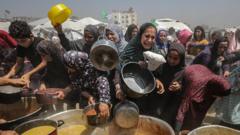The report, detailing a grave situation for Gaza’s population, underscores the urgent need for humanitarian intervention amid renewed military tensions and extensive food shortages.
**Gaza Faces Dire Food Crisis Amid Continued Blockade, UN Report Warns**

**Gaza Faces Dire Food Crisis Amid Continued Blockade, UN Report Warns**
A UN assessment reveals critical food insecurity threatening millions of Gazans due to ongoing humanitarian aid blockades.
In a stark warning, a UN-backed assessment has indicated that around 2.1 million Palestinians living in Gaza are at a "critical risk" of famine, with severe food insecurity escalating due to an ongoing Israeli humanitarian aid blockade. The report, compiled by the Integrated Food Security Phase Classification (IPC), highlights a significant decline in food security since October 2024, though it stops short of declaring a full-scale famine at present.
Following a two-month ceasefire during which conditions had moderately improved, renewed military action by Israel and a blockade on essential supplies since early March 2024 have significantly worsened living conditions in Gaza. The IPC report noted that approximately 244,000 individuals are in a state of "catastrophic" food insecurity, urging immediate intervention to avert a potentially burgeoning famine crisis.
Israel's military operations, intensified in mid-March, have restricted food, medicine, and other aid from entering Gaza as part of an effort to pressure Hamas into releasing hostages. The blockade has drawn international condemnation, with the UN and various humanitarian organizations asserting that it could be classified as a war crime due to its potential to induce starvation conditions.
According to the IPC, nearly 1.95 million Gazans (approximately 93% of the population) are experiencing acute food insecurity, with the grim prediction that around 71,000 children under five are likely to suffer from acute malnutrition over the next year. Families have resorted to desperate measures for sustenance, including begging and scavenging for food.
While Israeli officials have maintained that no hunger crisis exists in Gaza due to the quantity of aid received during the ceasefire, the report emphasizes the extent of the ongoing crisis. The IPC serves as a key instrument for the international community to assess famine conditions, with its findings indicating a troubling decline in food security and nutrition levels among the population.
Moreover, the report is released amid negotiations for a ceasefire, as Hamas announced it would release Israeli-American hostage Edan Alexander, potentially facilitating humanitarian aid access. However, Israeli officials have been cautious, indicating no commitments to a broader ceasefire agreement beyond ensuring a "safe corridor" for the hostage's return.
The humanitarian landscape continues to evolve, particularly as US President Donald Trump arrives in the region amidst promises from Israel to intensify military operations against Hamas if an agreement is not reached. Plans for expanded military action include the indefinite seizure of territories in Gaza and controversial strategies involving private companies to take over aid distribution. The report by the IPC warns that such plans are likely inadequate, with significant barriers anticipated for many residents in accessing necessary aid.
Overall, the situation in Gaza remains precarious, with the ongoing conflict coupled with severe food shortages leading to increased suffering and hardship for millions.
Following a two-month ceasefire during which conditions had moderately improved, renewed military action by Israel and a blockade on essential supplies since early March 2024 have significantly worsened living conditions in Gaza. The IPC report noted that approximately 244,000 individuals are in a state of "catastrophic" food insecurity, urging immediate intervention to avert a potentially burgeoning famine crisis.
Israel's military operations, intensified in mid-March, have restricted food, medicine, and other aid from entering Gaza as part of an effort to pressure Hamas into releasing hostages. The blockade has drawn international condemnation, with the UN and various humanitarian organizations asserting that it could be classified as a war crime due to its potential to induce starvation conditions.
According to the IPC, nearly 1.95 million Gazans (approximately 93% of the population) are experiencing acute food insecurity, with the grim prediction that around 71,000 children under five are likely to suffer from acute malnutrition over the next year. Families have resorted to desperate measures for sustenance, including begging and scavenging for food.
While Israeli officials have maintained that no hunger crisis exists in Gaza due to the quantity of aid received during the ceasefire, the report emphasizes the extent of the ongoing crisis. The IPC serves as a key instrument for the international community to assess famine conditions, with its findings indicating a troubling decline in food security and nutrition levels among the population.
Moreover, the report is released amid negotiations for a ceasefire, as Hamas announced it would release Israeli-American hostage Edan Alexander, potentially facilitating humanitarian aid access. However, Israeli officials have been cautious, indicating no commitments to a broader ceasefire agreement beyond ensuring a "safe corridor" for the hostage's return.
The humanitarian landscape continues to evolve, particularly as US President Donald Trump arrives in the region amidst promises from Israel to intensify military operations against Hamas if an agreement is not reached. Plans for expanded military action include the indefinite seizure of territories in Gaza and controversial strategies involving private companies to take over aid distribution. The report by the IPC warns that such plans are likely inadequate, with significant barriers anticipated for many residents in accessing necessary aid.
Overall, the situation in Gaza remains precarious, with the ongoing conflict coupled with severe food shortages leading to increased suffering and hardship for millions.

















